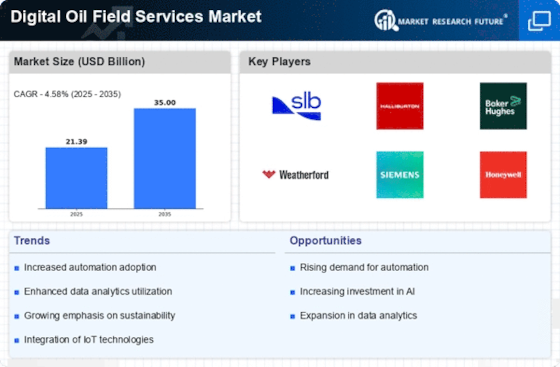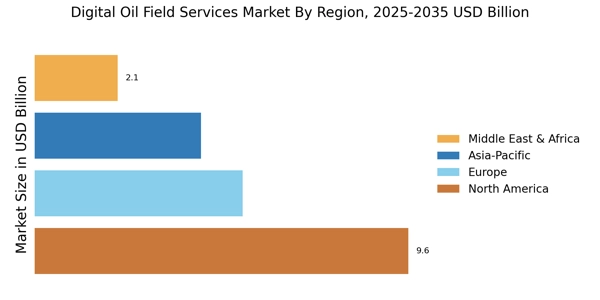Enhanced Operational Efficiency
The Digital Oil Field Services Market is witnessing a notable shift towards enhanced operational efficiency. Companies are increasingly adopting digital technologies to streamline their operations, reduce downtime, and optimize resource allocation. For instance, the integration of advanced data analytics and real-time monitoring systems allows for predictive maintenance, which can significantly lower operational costs. According to recent estimates, organizations that implement these digital solutions can achieve up to a 20% reduction in operational expenses. This trend indicates a growing recognition of the importance of efficiency in maintaining competitiveness within the Digital Oil Field Services Market.
Growing Demand for Real-Time Data
In the Digital Oil Field Services Market, there is a burgeoning demand for real-time data analytics. The ability to access and analyze data instantaneously is becoming crucial for decision-making processes in oil and gas operations. Companies are leveraging digital platforms to gather data from various sources, including sensors and IoT devices, which enables them to make informed decisions swiftly. This trend is reflected in the increasing investment in digital technologies, with projections suggesting that the market for real-time data solutions could reach several billion dollars by 2026. Such advancements are likely to enhance operational agility and responsiveness in the Digital Oil Field Services Market.
Integration of Artificial Intelligence
The integration of artificial intelligence (AI) into the Digital Oil Field Services Market is emerging as a transformative driver. AI technologies are being utilized to analyze vast amounts of data, identify patterns, and predict outcomes, thereby enhancing decision-making capabilities. This integration not only improves efficiency but also aids in risk management by providing insights that were previously unattainable. Reports indicate that the AI segment within the oil and gas sector is expected to grow significantly, potentially reaching a market size of over 3 billion dollars by 2025. This trend underscores the pivotal role of AI in shaping the future of the Digital Oil Field Services Market.
Regulatory Compliance and Safety Standards
Regulatory compliance and safety standards are increasingly influencing the Digital Oil Field Services Market. As environmental concerns and safety regulations become more stringent, companies are compelled to adopt digital solutions that ensure compliance and enhance safety protocols. Digital technologies facilitate better monitoring and reporting of compliance metrics, which can mitigate risks associated with non-compliance. The market is likely to see a rise in demand for digital services that support these regulatory requirements, as organizations strive to maintain their operational licenses and uphold their reputations. This trend indicates a growing intersection between regulatory frameworks and digital innovation in the Digital Oil Field Services Market.
Focus on Sustainability and Environmental Impact
The focus on sustainability and minimizing environmental impact is becoming a critical driver in the Digital Oil Field Services Market. Companies are increasingly adopting digital solutions that not only enhance operational efficiency but also reduce their carbon footprint. Technologies such as remote monitoring and automated systems enable organizations to optimize resource usage and minimize waste. As stakeholders demand greater accountability regarding environmental practices, the market for sustainable digital solutions is expected to expand. Projections suggest that investments in sustainable technologies within the oil and gas sector could exceed 5 billion dollars by 2027, highlighting the importance of sustainability in the Digital Oil Field Services Market.


















